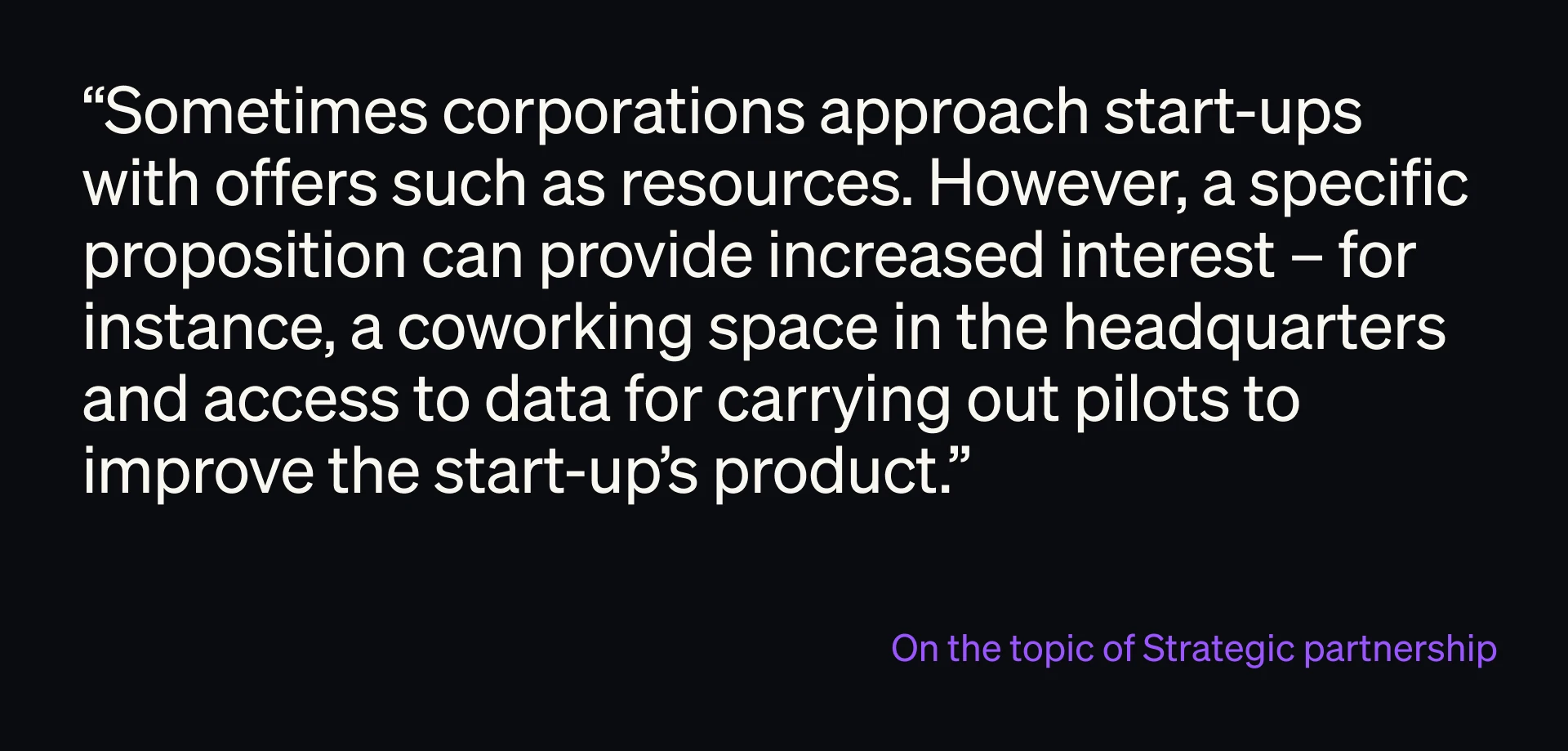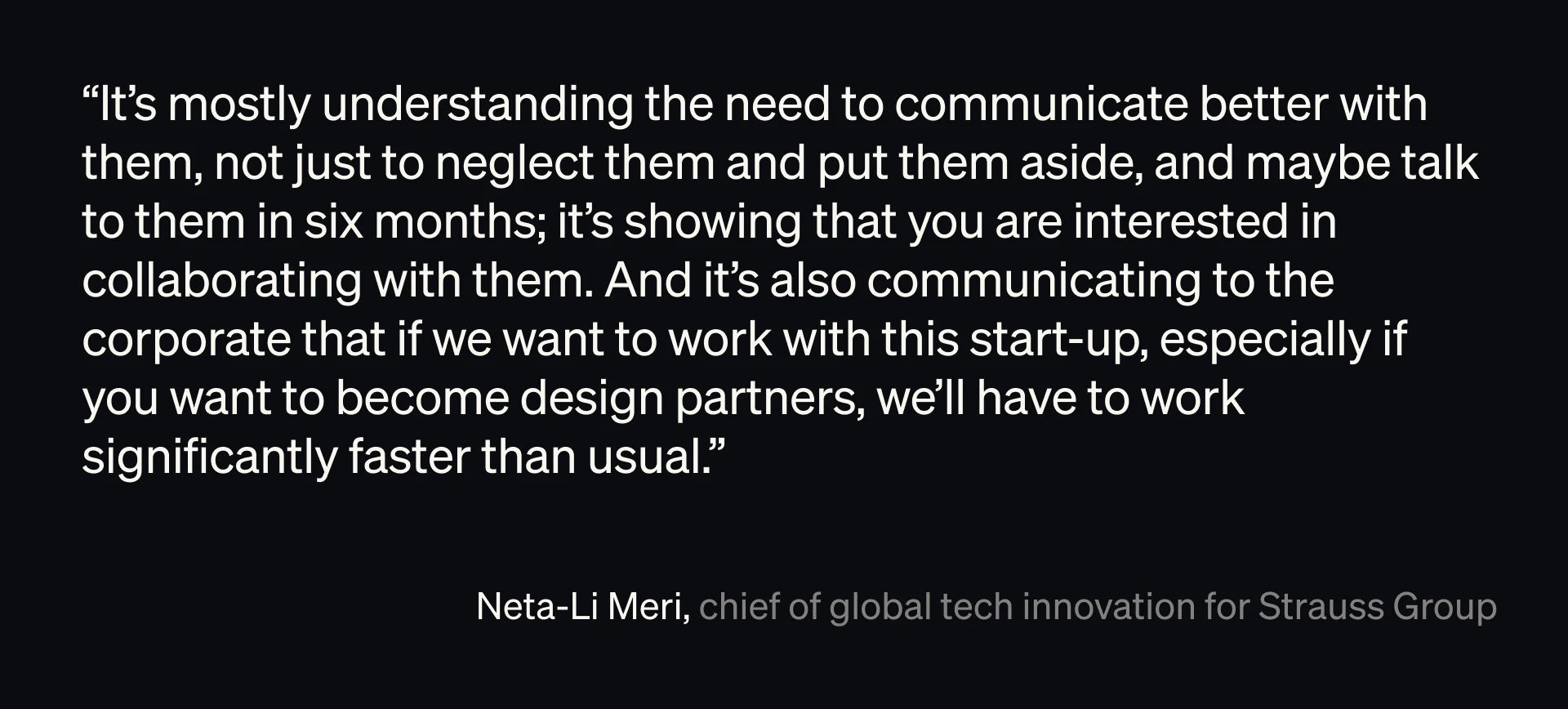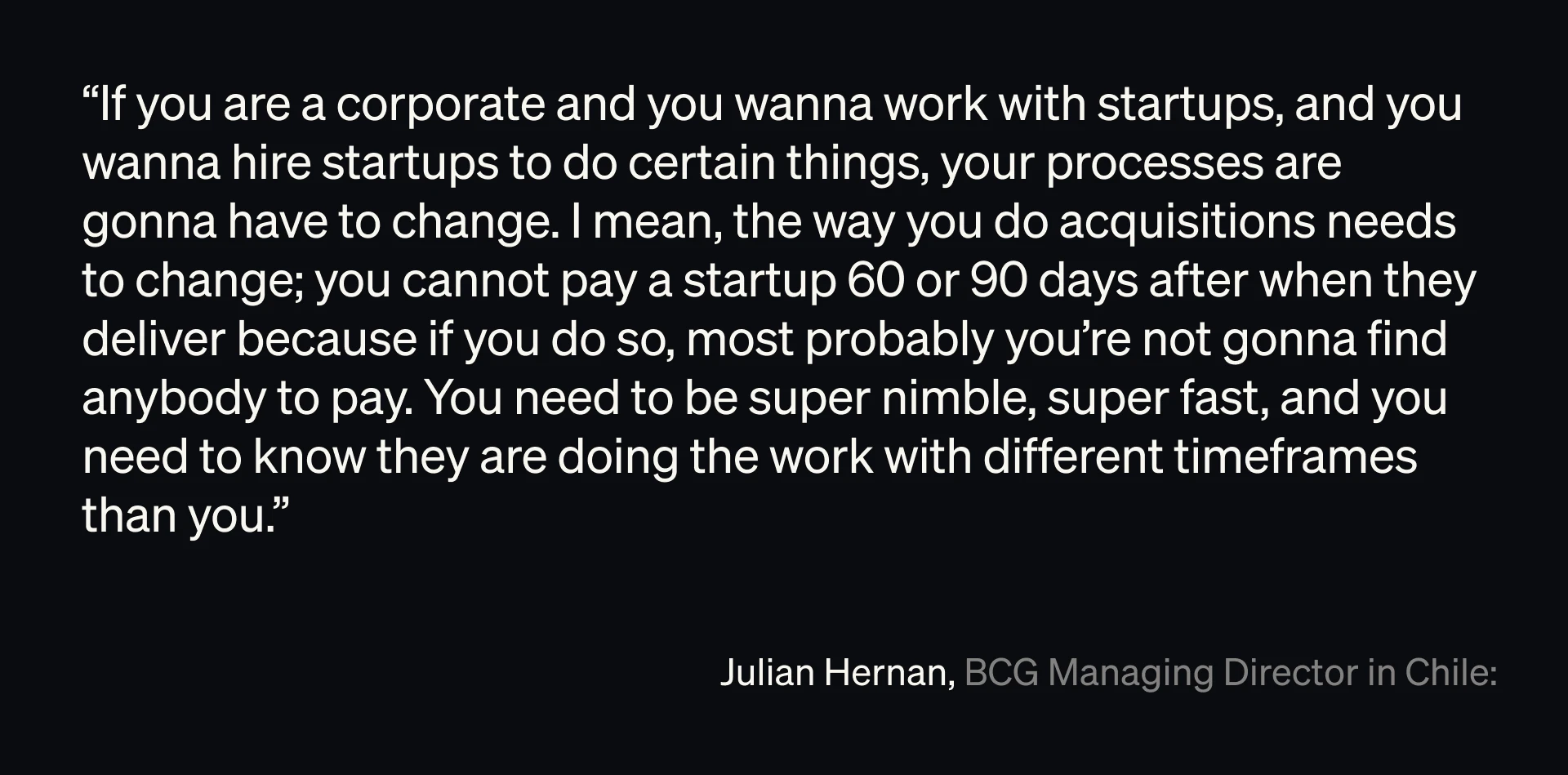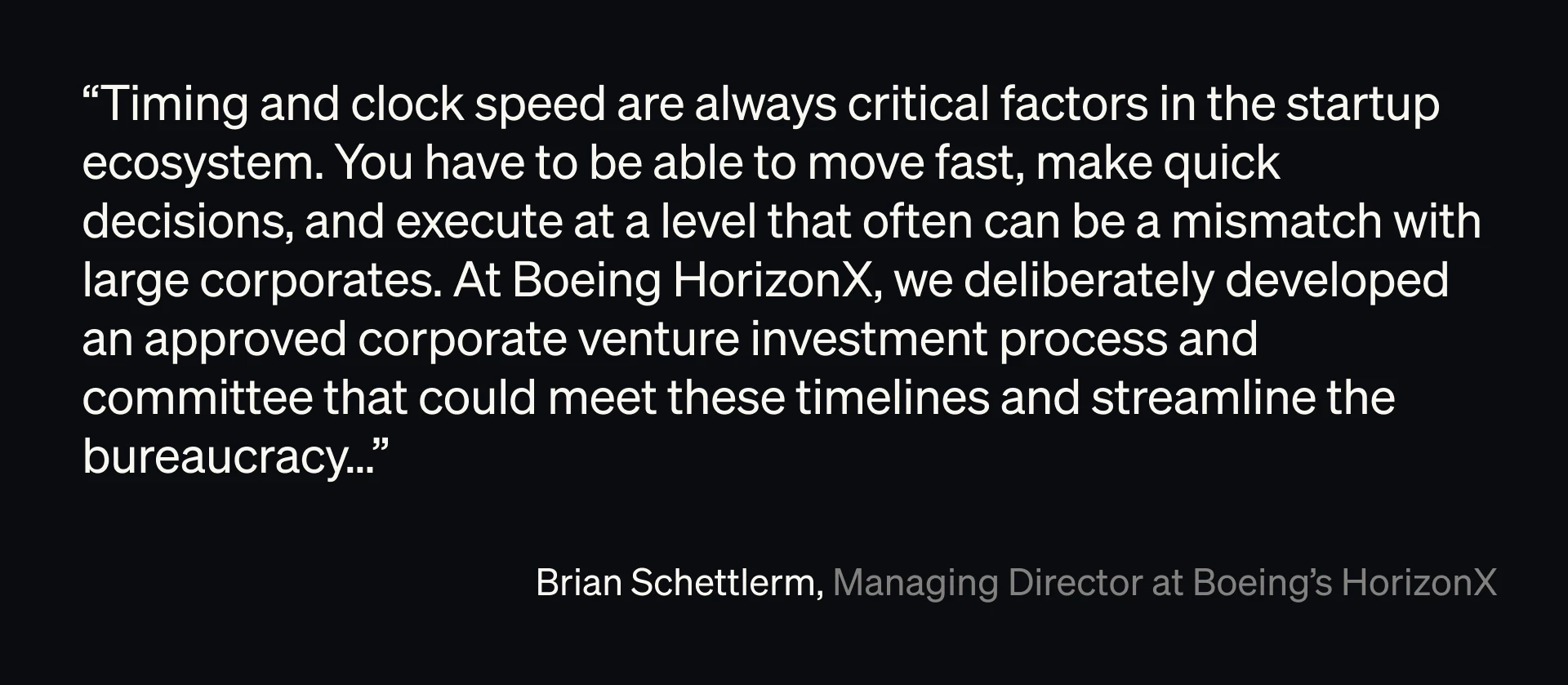Key takeaways
In today's fast-moving and highly competitive landscape, startups aren’t just making waves — they're reshaping entire industries with new technologies, lean business models and cutting-edge offerings that customers love. Add to that the backing, assets and expertise of an established enterprise, and you get a winning innovation strategy that merges the best of two worlds:
- The vast expertise, assets and reach of corporations
- The nimbleness, innovation and speed of startups
These corporate-led startup partnerships are enabling companies all over the world to innovate with unprecedented speed, setting a new standard where early adaptors get the lion's share of the market and the profits. They enable companies to create a thriving ecosystem that fuels growth with a constant pipeline of products, solutions and services, boosting their chances of success even in the most unpredictable of market conditions.
The key to it all? Spotting, attracting and engaging startup partners that align with your growth goals, culture, and corporate vision. Read on to find out more about how to effectively seek out and partner with startups that can help you hit your next innovation milestone.
Identifying startups that align with your corporate vision
There’s a myriad of ways to find potential startups. Some of the most popular include corporate events, demo days, conferences, VC networks, joining innovation associations, or even spearheading corporate initiatives like hackathons and incubator/accelerator programs.
Platforms like LinkedIn and online databases like Crunchbase, AngelList, CBInsights, and Pitchbook are also valuable resources to start your search.
These avenues provide handy initial data on potential partners, but a deeper screening is needed to determine how well they align with your corporate vision, both short and long-term. Meeting founders or commercial teams gives you the opportunity to ask strategic questions and gain a more detailed understanding of the startup’s mission, technology, culture and more.
Here are just a few areas to focus on during your initial screening:
- Goals: Understanding a startup's goals helps ensure alignment with corporate interests and potential for sustainable growth.
- Fit (industry, market, technology): Too many similarities can cancel out the benefits each partner brings to the table. Seek startups offering solutions that complement the corporate's business to ensure shared expertise and synergies.
- Development stage: Early-stage startups often have visionary concepts and ideas but run the risk of failing before delivering any value. On the other hand, later-stage startups with an MVP and first customers offer a higher potential for rapid implementation.
- Culture: It’s essential to understand the startup’s culture and values. Compatibility fosters smoother integration and can significantly impact the success and sustainability of the partnership.
- Team: Understanding the quality of the team, the founder’s educational and professional background, and their past entrepreneurial successes can indicate potential.
- Track record: Testimonials from previous collaborations provide a glimpse into their reliability.
Once your potential startups are earmarked, tools like Pipedrive, Trello, and Airtable can help streamline interactions, collaborations, and integration processes.
Attracting startups that align with your corporate vision
For many companies, the big question is: How can we not just capture the attention of these startups but also resonate with them? Here are a few tips to help you get started:
Craft an irresistible value proposition (VP)
In a landscape with numerous corporates in a race to snatch up the best startups, a compelling VP can help you stand out from the crowd. Successful VPs align with startup aspirations and also offer a crystal-clear blueprint of mutual growth avenues. This not only minimises misalignment risks but fortifies the foundation of the partnership.
The first step? Put yourself in the startup’s shoes. When crafting your VP, keep in mind that startups tend to prioritise partners that can provide crucial growth resources like market access, technical expertise, industry/customer insights, development tools or boost their reputation in the market through brand association. Your VP should also be clear and tangible, as explained in this study from IESE Business School:

Make sure to tailor your value proposition to the startup's needs, taking their input into account during the process.
Showcase your vision strategically
Start with the “when”, not the “how”. Introducing startups to your corporate vision early on can help gain their attention. Once you have that, you can dive into the details of the potential partnership.
Also, highlight your past wins. Startups are more likely to engage with corporates that have a track record of successful collaborations. So make sure to include detailed success stories and case studies from previous collaborations.
Build relationships within the startup ecosystem
We’ve already touched on this above, but attending startup events, demo days, tech meetups, and industry conferences are all great ways to meet founders and learn about the latest innovations and players in your desired segment. As advised in a Fortune 500 survey sponsored by Techstars:

Corporate initiatives like hackathons and other corporate venture mechanisms can also help you build a presence in the ecosystem.
Engaging startups that align with your corporate vision
Open and transparent communication is key. Make sure you clearly convey your corporate’s perspective, growth goals, decision-making process, timeline and more. It’s also important to really understand the needs of the startup and communicate how you can effectively meet them. As explained by Neta-Li Meri, chief of global tech innovation for Strauss Group:

Here are a few other tips to help you successfully engage startups:
- Set clear expectations: Ensure collaboration goals are defined upfront. This transparency ensures aligned expectations and outcomes.
- Demonstrate corporate commitment: Startups need to see commitment. Make sure to get and showcase top management buy-in and active support from "early adopters", “advocates”, and "enthusiasts" from within the company.
- Manage the culture clash: There’s a big contrast between agile startup environments and the more structured corporate world. Get ahead of it by appointing a dedicated liaison to facilitate smoother interactions, ensuring alignment and mutual understanding.
- Leverage corporate strengths: Corporates should actively use their resources (e.g. technical, regulatory, supply chain, etc.) to nurture their startups and boost their chances of success.
Forging successful partnerships with startups
Startups are all about speed. Delays are costlier for them because they often have limited resources. That’s why Corporates that take steps to speed up their processes and internal bureaucracy have a better chance of successfully engaging them. As explained by Julian Hernan, BCG Managing Director in Chile:

Brian Schettlerm, Managing Director at Boeing’s HorizonX venture capital division, had similar thoughts on the subject:

Here are a few additional tips:
Use startup-friendly contracts
Many corporations include exclusivity, preferential sale clauses or other potentially burdensome conditions in their partnership agreements. This can lead startups to lose interest in collaborating. As explained in an IESE study:
“Start-ups usually perceive corporations as a threat and fear that the big companies will steal their ideas and cause the start-ups to lose ownership of those ideas…”
A good way to calm these fears is to adopt a phased approach that initiates with a memorandum of understanding (MOU) before finalising the contract. It’s also a good idea to sort out IP ownership concerns from the outset.
Maintain strong relationships post-engagement
A good way to build your reputation in the startup ecosystem is by nurturing long-term relationships with startups even after the partnership is over. Why? Well, one of the primary incentives for startups to collaborate with larger entities is the prospect of securing them as future clients. For example, after a pilot phase, corporates can promptly craft a clear roadmap outlining the next steps.
A roadmap not only provides startups with insights into the corporate's vision for ongoing collaboration but also ensures mutual understanding and alignment of expectations. Corporations can also help startups amplify their success story through case studies, press releases, or simply letting startup partners showcase the corporate logo on their website.
The role of startup sourcing partners
Startup sourcing partners can be valuable intermediaries, leveraging their expertise, networks, and tools to ensure that corporations and startups come together in collaborations that are aligned and successful. Examples of potential startup sourcing partners include:
- Venture Builders (aka, Startup Studios), like Bundl
- VC firms like Sequoia Capital and Andreessen Horowitz
- Incubators and accelerators like Y Combinator and Techstars
- Industry-specific partners like MedTech Innovator (for healthcare) and Plug and Play (for Fintech)
Each type of sourcing partner offers distinct advantages, and the best fit will depend on your corporation's unique goals and needs. The big question, then, is, what kind of benefits do they bring to the table? Here are just a few:
- Experience and expertise: Sourcing partners have a deep understanding of the startup ecosystem. Their seasoned teams can quickly identify startups that align with a corporation's strategic goals and are at the right maturity level for collaboration.
- Extensive networks: Sourcing partners can introduce corporations to a vast pool of potential startup partners, including those that might not be on the usual radar.
- Time and cost efficiency: Navigating the vast startup ecosystem can be time-consuming and resource-intensive. Sourcing partners can help you save time and reduce costs, focusing only on startups that are a genuine fit.
- End-to-end approach: From initial scouting to the final handshake, sourcing partners guide corporations through every step. They assist in negotiations, perform due diligence, set up meetings with key decision-makers, and provide post-deal support to ensure collaborations thrive.
- Ecosystem understanding: Startup sourcing partners provide corporations with invaluable insights into the startup ecosystem, helping them understand the motivations, challenges, and aspirations of startups.
These benefits can be especially valuable for companies that are just getting started, providing some much-needed guidance and direction to kick off their journey.
Final thoughts
Navigating today’s vast and ever-evolving startup ecosystem can be as exciting as it is daunting. The secret? Pinpointing those nascent companies that not only match your corporate ethos but also set the stage for ground-breaking innovation and growth.
Remember that while the landscape is filled with potential partners, the right alignment is paramount. It's not about working with the hottest startup but collaborating with the one that complements your corporate culture and resonates with your core values and strategic direction. Follow the tips above to help guide your journey and be sure to check out our guide on Corporate-Led Startup Partnerships for more details.
___
Looking to attract and engage with cutting-edge startups that align with your organisation's long-term growth goals and vision? We can help you tap into the external startup ecosystem, build strategic partnerships, and unlock new opportunities for growth through collaboration.
11 Key Steps for Successful Startup Partnerships
How to forge startup partnerships that tap into disruptive ideas and innovative business models.











.svg)


